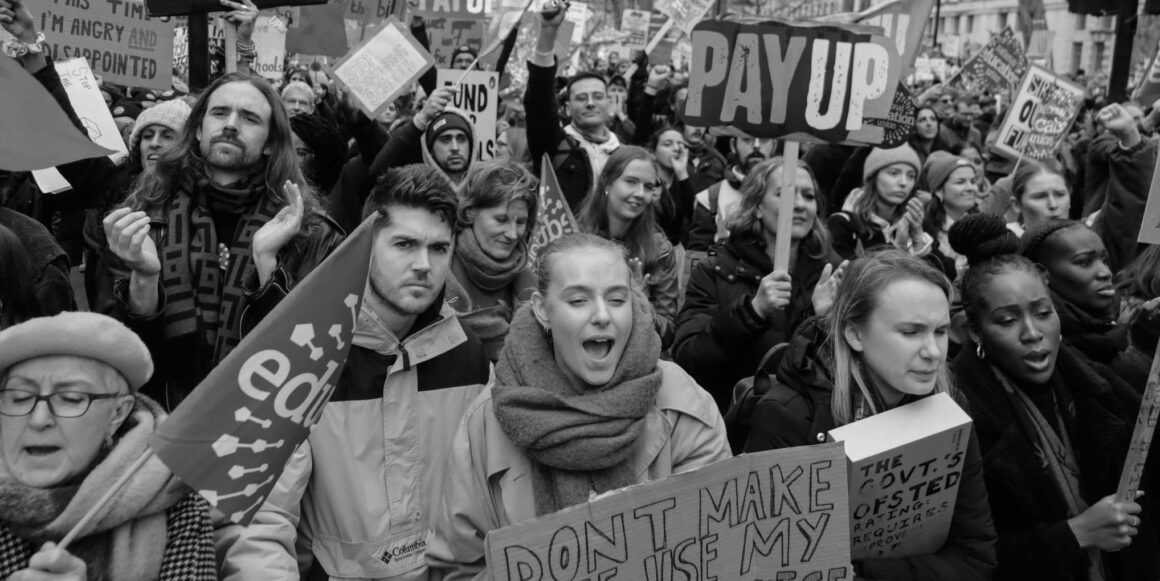

THE NATIONAL Education Union (NEU) has voted overwhelmingly to take strike action for a fully funded, above inflation pay rise. Two days of strike action on 27 April and 2 May followed a ballot to reject the Government’s derisory offer of 4.3% and a one off payment of £1,000. A majority of 98% sends a clear message that teachers and support staff are not prepared to see their pay cut as the cost of living crisis deepens.
The strikes had been preceded by a massive show of strength by the union on 15 March as tens of thousands marched in London in an impressive Save Our Schools carnival alongside other workers who took strike action that day. The widespread thirst for action has actually seen the NEU increase its membership by over 50,000. Workplace organisation has strengthened as a new layer of union representatives has emerged.
The union is very clear that this is not just about pay but also about saving our education system from Tory attacks and underfunding. Previous pay cuts have had a devastating impact on the ability to recruit and retain teachers. The shortage of teaching assistants and support staff is also a perennial problem. Add into the mix the escalating workload and excessive accountability that teachers face and it makes for a grossly underfunded education system in severe crisis.
Education Secretary Gillian Keegan has now withdrawn her latest offer which had been roundly rejected anyway. Union general secretaries Mary Bousted and Kevin Courtney, who have been campaigning for a 12% pay rise, have stressed that teachers’ pay has ‘lost 23% in real terms since 2010 and support staff 27% over the same period’. They continue to call for more negotiations with the government whilst pursuing limited strike action over a protracted period of time.
The union strategy so far has seen a one day strike, some regional ones, and a couple of two day strikes since February. The union now intends to use the period of examinations from 15 May to begin a re-ballot of teacher members in England running until the end of July and timetable in a 3 day strike in late June/early July to be confirmed by the National Executive on 18 May. Of course, this is on condition that the union has not agreed to a new deal.
NEU joint general secretary Mary Bousted said on Thursday that the union had asked “for an above-inflation pay rise, but we’d be prepared to negotiate a decent pay rise,” adding that the union would consider a multi-year deal.
This shows the union’s strategy is aimed at securing a similar deal to the one accepted by NEU members in Wales in March. That deal consisted of 1.5 percent consolidated, and 1.5 percent non-consolidated, followed by 5 percent from September 2023. The deal ties teachers into two-years of real-terms pay cuts, and included nothing for support staff, in the one region where they crossed the ballot threshold for strike action.
Escalation
Rank and file members must question why this strategy from the leadership has not forced the government’s hand at all. The stakes are very high in this dispute and a militant mood amongst the membership must not be dissipated by occasional strikes followed by lengthy negotiations and then re-ballots, if not ballots on under inflation deals.
Strikes have to escalate quickly and for over a significant period of time otherwise we fall into the government’s waiting game. Strikes must be organised with a view to winning the battle for inflation-proof pay not as a means of merely protesting. Rank and file activists need to tap into the rise in union consciousness and workplace organisation by building a rank and file movement that can coordinate action. Such a movement could also be the springboard to assuming control of the strikes and negotiations and to fight any backtracking from the union leaders.